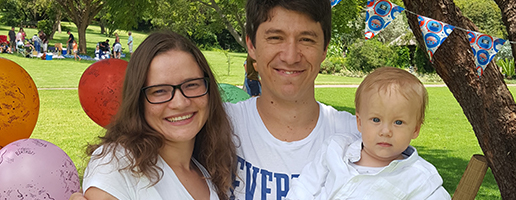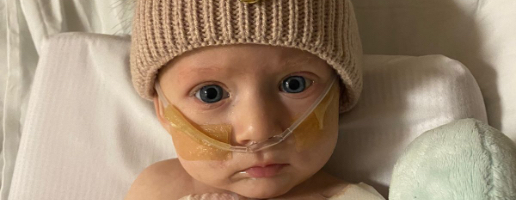Reona recovers in the comfort of home with Hospital at Home

For Reona Naidoo, the Hospital at Home programme has made getting sick regularly (post a surgery in 2019) more bearable. She now has access to 24/7 treatment and monitoring, giving her peace of mind about her health - and also about avoiding separation from her two children for days on end.
Ever since Reona Naidoo (32) had her spleen and a kidney removed in 2019, she's been prone to picking up infections and being hospitalised.
Luckily, with Discovery Health Medical Scheme's (DHMS) new Hospital at Home, Reona has this year been able to receive high-quality medical care in the comfort of her own home, and avoid extended hospital stays. Hospital at Home offers 24/7 treatment and monitoring (both in-person and virtual) by a dedicated care team.
- Watch our video on Hospital at Home.
In fact, Reona was one of the first patients to benefit from the new Hospital at Home programme, which was launched in January this year.
"The fact that I have been able to receive hospital-level care at home means I can be with my two daughters, aged two and 10, during my recovery," says Reona - a sales manager based in a KwaZulu-Natal.
Family and familiarity - a tonic for this Hospital at Home patient
Reona's health challenges started in 2017, when she was treated, in hospital, for painful kidney stones. Soon after that, she landed up in hospital again with septicaemia and pneumonia, this time for a 36-day-long stay.
In 2018, pregnant with her second child, she experienced kidney pain again and was told that she needed to have one of her kidneys removed once she'd had her baby. Eventually, in November 2019, she had a kidney and her spleen removed.
Fast-forward to February 2022, and Reona was hospitalised once again with pneumonia. When, after five days in hospital, her doctor asked if she would rather receive treatment at home, she jumped at the opportunity.
Reona's doctor motivated for her admission to Hospital at Home as Reona is at high risk of picking up other infections when she's in hospital. "So, I have to stay in an isolation room when I'm at hospital, which is tough. I don't enjoy it," she says.
"Hospital at Home was a completely new experience of care, and I hope I would be eligible for the programme if I were to become ill again in future and need hospital-level care. Being treated at home after an initial five days in hospital meant there was some sort of normality to my life. When you're sick, you want to be in your own bed, eat your own food, and you want to see your family because they cheer you up."
"The nurses are so professional and give you the utmost care"
Reona's husband collected her from hospital once she'd been discharged, to take her home. That same evening, nurses arrived at her home to attach the Biofourmis device to her arm, set up her Hospital at Home phone app, explain how everything worked, and make sure she was comfortable. "The nurses are so professional. They give you the utmost care and they're very specific in how they do things," she says.
For the five days that Reona was treated at home, nurses visited her two to three times a day. They set up a drip for her, administered her medication, and nebulised her. Reona was impressed when the care team at the control centre phoned immediately to check on her when the Biofourmis device became loose on her arm and stopped monitoring her vital signs.
Reona praises the Hospital at Home programme. "I want to say thank you to DHMS for being so broad-minded and coming up with this amazing idea for your medical scheme members, so they benefit from getting care at home the same way they'd receive it in hospital," she says.
"I think the way it was executed was excellent. I didn't have any issues with treatment, with the nurses following up, or with the paperwork. I'm actually very impressed."
Reona has since recommended the Hospital at Home programme to two colleagues, who have, with the help of their doctors, also benefited from the service.
- Listen to Reona chat to Sr Zanele Moeketsi, a member of Reona's Hospital at Home care team, about her experience of this benefit.
Hospital at Home could become South Africa's largest home care provider
- Patients admitted to the Hospital at Home programme have access to an app which is linked to the remote-monitoring Biofourmis device. Biofourmis is a global leader in digital monitoring solutions. This ground-breaking device is worn on the patient's arm and continuously monitors multiple physiological signals, sharing these in real-time not only with the patient, but also with the care team and the 24/7 control centre.
- Artificial Intelligence (AI) algorithms applied to the readings provide an additional predictive view of a patient's disease trajectory, which is key to detecting issues, intervening early, and preventing potential medical crises.
- Hospital at Home could become South Africa's largest hospital at home provider considering that the system can currently "admit" up to 750 patients simultaneously - patients who would otherwise require traditional in-hospital admission for the duration of their treatment.
- Keen to know more? Read the Hospital at Home Benefit Guide.
Adoption of hospital at home care programmes accelerated by COVID-19
Globally, there was already movement towards home-based care systems before the COVID-19 pandemic started. However, there wasn't much traction, says Dr Botho Mhozya, who heads Health Professional Risk at Discovery Health and the DHMS Hospital at Home programme. "The pandemic accelerated hospital at home-type care and the adoption of digital tools to support the provision of that care," she says.
During the most severe periods of the pandemic, health systems were overwhelmed, many patients had to fend for themselves when health facilities reached capacity, and most patients were isolated from their families. Hospitals became a scary place to be during the pandemic and patients started seeking new ways of getting care. The response to this was a global proliferation of hospital at home programmes and the adoption of digital tools and telemedicine," says Dr Mhozya.
While Dr Mhozya acknowledges that some doctors might be nervous to treat their patients out of hospital, she says that there's an abundance of literature that illustrates improved clinical outcomes as well as greater patient experience and satisfaction when they are treated at home rather than in a traditional hospital. "We encourage doctors to embrace the programme and the technology. Once they start using it, they will get an appreciation of Hospital at Home and feel comfortable in using the services."
Personalised care builds trust between doctors and patients
Dr Mhozya describes the DHMS Hospital at Home programme as patient centric. "You might say it's a hybrid between old-school medicine, where doctors used to come into the patient's home and your care was personalised. But on the other hand, you've got this digital, high-tech, sophisticated touch to compliment that. This feeds real-time, actionable insights to the care team early onto ensure the patient is safe and getting the appropriate care."
This model, she says, builds trust and enhances communication between doctors and their patients. Patients have more opportunity to engage with their doctors and nurses and patients can follow their progress through the Hospital at Home app. Daily tasks such as questionnaires, and confirming that they've taken their medication, makes them an empowered and important stakeholder in their own care.
"Models like these enable us to not only bring care to you in your home, but to personalise it to make it fit-for-purpose for you," says Dr Mhozya.
Related articles

All you need to know: New Assisted Reproductive Therapy (ART) benefit
Discovery Health Medical Scheme has launched an exciting new benefit to support members affected by infertility. The all new Assisted Reproductive Therapy Benefit brings much needed support to couples struggling to conceive.

Cystic fibrosis didn't get in the way of Chantelle's dreams of becoming a mom
One of the most magical moments in 27-year-old Chantelle Van Wyk's life took place on 25 January 2017, when her son, Jonathan, was born. Chantelle has cystic fibrosis, making a successful pregnancy a major undertaking.

Baby Mighty Mack's fight against acute myeloid leukaemia
On 13 May 2021, Mackenzie "Mighty Mack" Friedman was diagnosed with acute myeloid leukaemia (AML). Seemingly overnight, the perfectly healthy six-month-old became a very ill cancer patient in need of urgent treatment - and a bone marrow transplant.